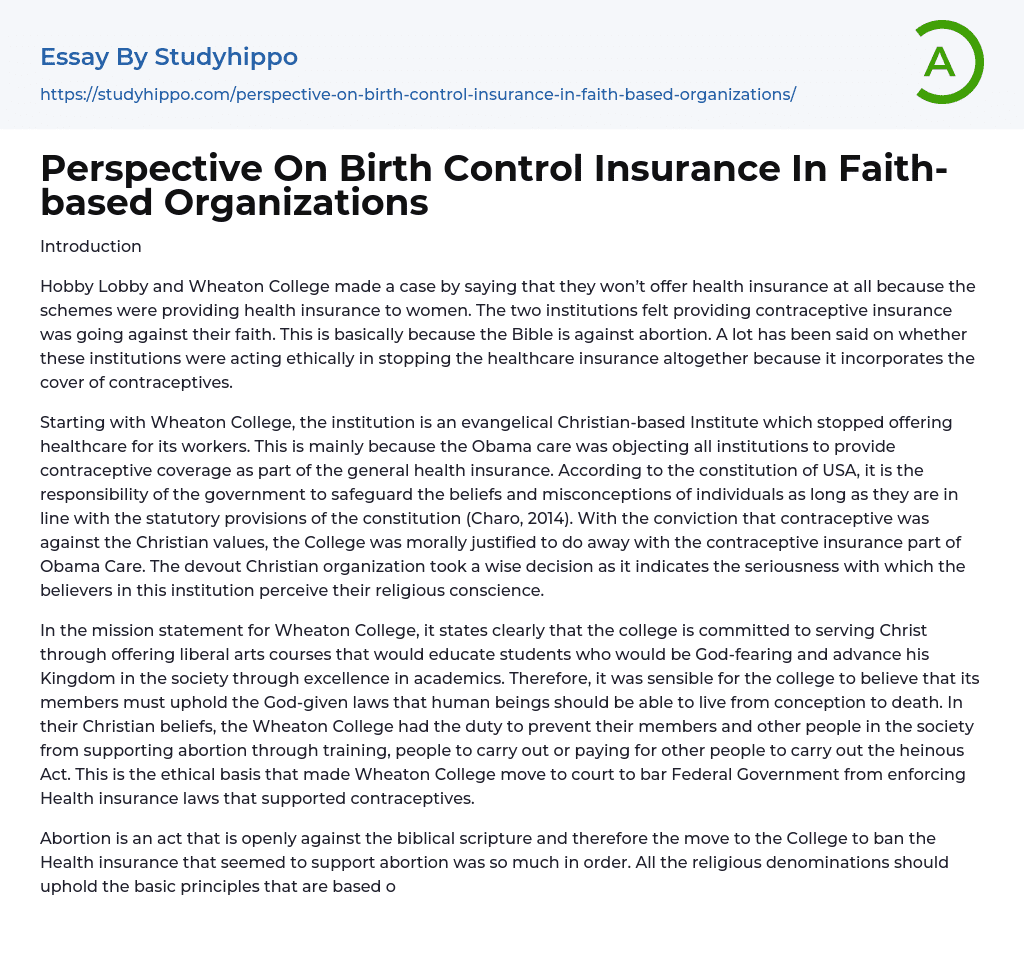

Perspective On Birth Control Insurance In Faith-based Organizations Essay Example
Introduction
Both Hobby Lobby and Wheaton College argued that they would not provide any health insurance because the insurance plans offered coverage for contraception, which both institutions believed went against their religious beliefs.
The reason for institutions like Wheaton College to stop offering healthcare for their workers is primarily due to their opposition to contraceptives, which goes against the Bible's teachings. This has sparked ethical debates on whether these institutions were justified in completely eliminating healthcare insurance. Wheaton College, an evangelical Christian-based Institute, made this decision because the Affordable Care Act mandated all institutions to include contraceptive coverage in their health insurance plans. According to the US constitution, it is the government's responsibility to protect individuals' beliefs and misconceptions as long as they comply with the constitution's laws (Charo, 2014).
Wheaton College a
...cted within its Christian values by removing the contraceptive insurance component of Obama Care. This decision showcases the college's deep commitment to its religious beliefs, as stated in their mission statement. The institution's mission is to provide a liberal arts education that produces individuals who fear God and can positively impact society through academic excellence. Therefore, it is reasonable for the college to expect members to adhere to God-given laws that protect life from conception until death. Due to their Christian principles, Wheaton College felt compelled to educate and discourage both their members and society as a whole from supporting abortion by training individuals not to participate in or financially support this sinful act.
Wheaton College pursued legal action to prevent the Federal Government from enforcing contraceptive-endorsing healthcare laws. The College's ethical foundation, rooted in biblical scripture, opposes abortion and necessitates the upholding
of religious principles even in challenging situations like those faced by Wheaton College. According to Christian beliefs, life begins at egg fertilization before implantation in the womb. Certain contraceptives provided by the Healthcare system aim to hinder the implantation of fertilized eggs, contradicting these Christian beliefs.
In terms of abortion, as devout Christian believers, taking the matter to court to block health insurance was seen as ethically justified. However, Hobby Lobby, a Christian store chain, was granted an exemption by the Supreme Court to offer partial birth control insurance to its employees. Although the Federal government approved 20 contraception medications, Hobby Lobby objected to four of them as they believed these supported abortion, which goes against Christian beliefs. According to Steve Green, the President of Hobby Lobby Stores, the company refused to comply with the government's request as it conflicted with their faith. Nonetheless, they successfully obtained an objection against contraceptive health insurance coverage.
The two companies' actions of going to court to oppose health care laws were commendable. The laws were deemed unconstitutional and unethical, as they sanctioned the termination of unborn lives. According to the Bible, this act was unjustifiable. Therefore, amendments should be made to the provisions of the Obama care to remove controversial clauses that contradict ethical and Christian beliefs on life, and to cater to all groups in the population. The constitution dictates that government policies and clauses should not conflict with religious beliefs, societal expectations, and overall ethics.
Abortion is viewed as immoral and unethical in numerous communities, while the Constitution of the USA affirms the right to life for all individuals. Consequently, the government's implementation of healthcare policies that indirectly backed
abortion raised contradictions. Wheaton College and Hobby Lobby raised an ethical argument when they opposed including contraceptive insurance within their coverage. Nevertheless, excessive restrictions on contraceptive insurance proved detrimental to the overall population.
In the case of Wheaton College, eliminating students' public health care insurance had negative consequences for low-income students. The institution should focus on removing the contraceptive coverage aspect rather than entirely eliminating health insurance due to the contraceptive clause. Ultimately, both institutions acted in good faith to uphold biblical teachings of protecting unborn life. As a result, they were justified in defending the ethical standards and moral beliefs connected to the contraceptive coverage and its association with abortions.
References
- Charo, R. A. (2014). The Supreme Court Decision in the Hobby Lobby Case: Conscience, Complicity, and Contraception. JAMA internal medicine, 174(10), 1537-1538.
- Harbach, M. J., ; Walsh, K. C. (2014). Religious Liberty and Access to Contraceptives Coverage in the Wake of Hobby Lobby and Wheaton College.



